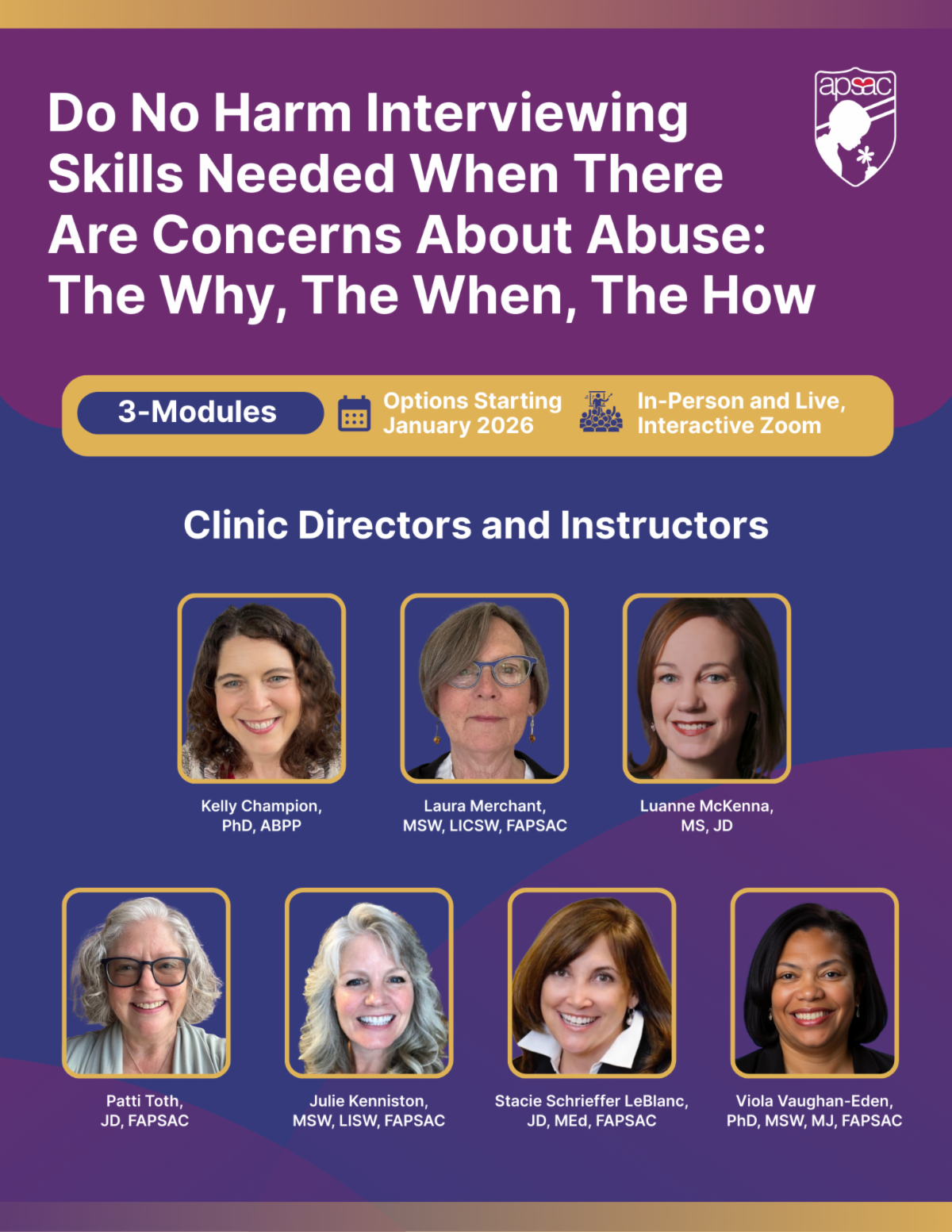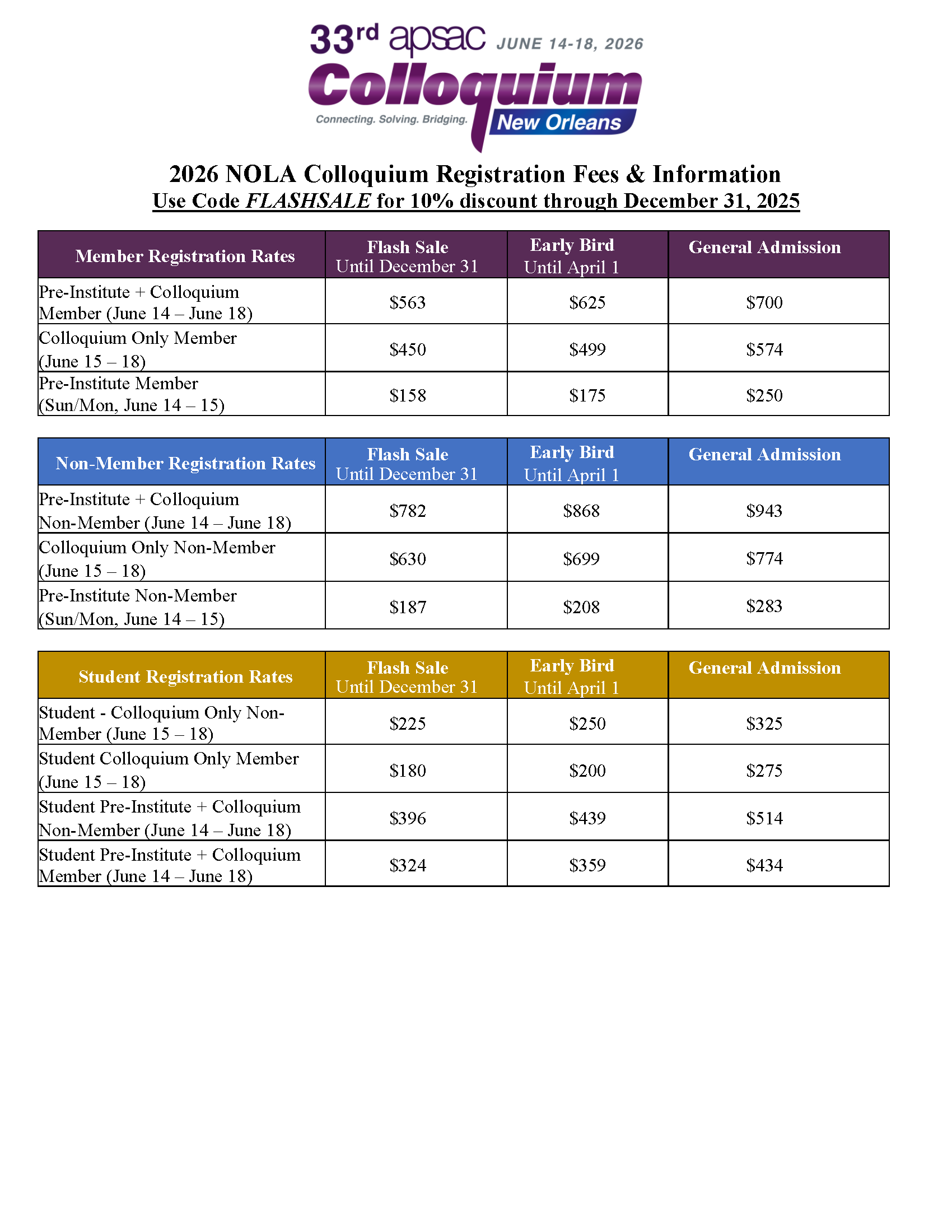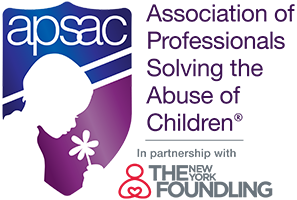
| 1/5/2026 -6/18/2026 | 8:00am to 5:00pm | ||||||||||||||||||||||||||||||||||||||||||||||||||||||||||||||||||||||||||||||||||||||||||||||||||||||
The APSAC Prevention Series returns in 2026 will be held on the 3rd Thursday of the month. This is a monthly opportunity to learn from leading experts in child maltreatment prevention and child well-being offered to expand your toolkit with the strategies and resources needed to implement effective prevention practices and improve outcomes for children and families. Member Registration: Free Non-Member Registration: $149 APSAC MEMBERSHIP INFORMATION 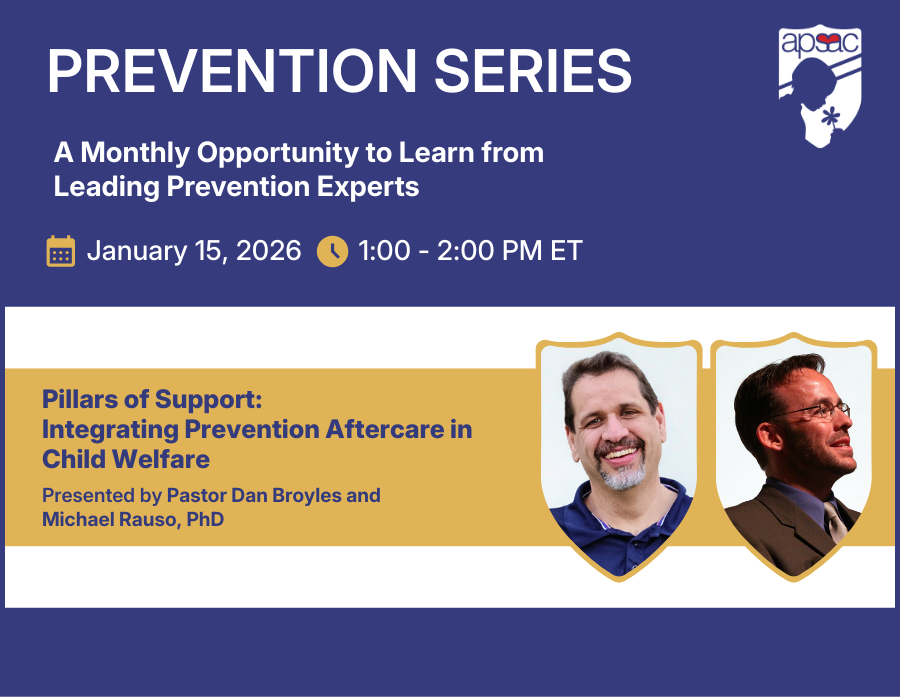 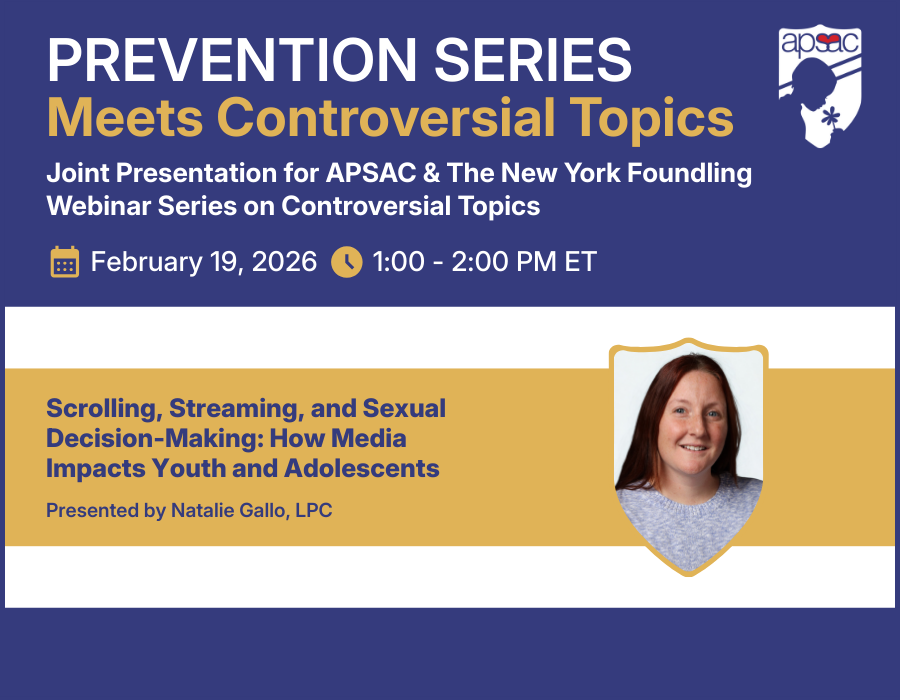 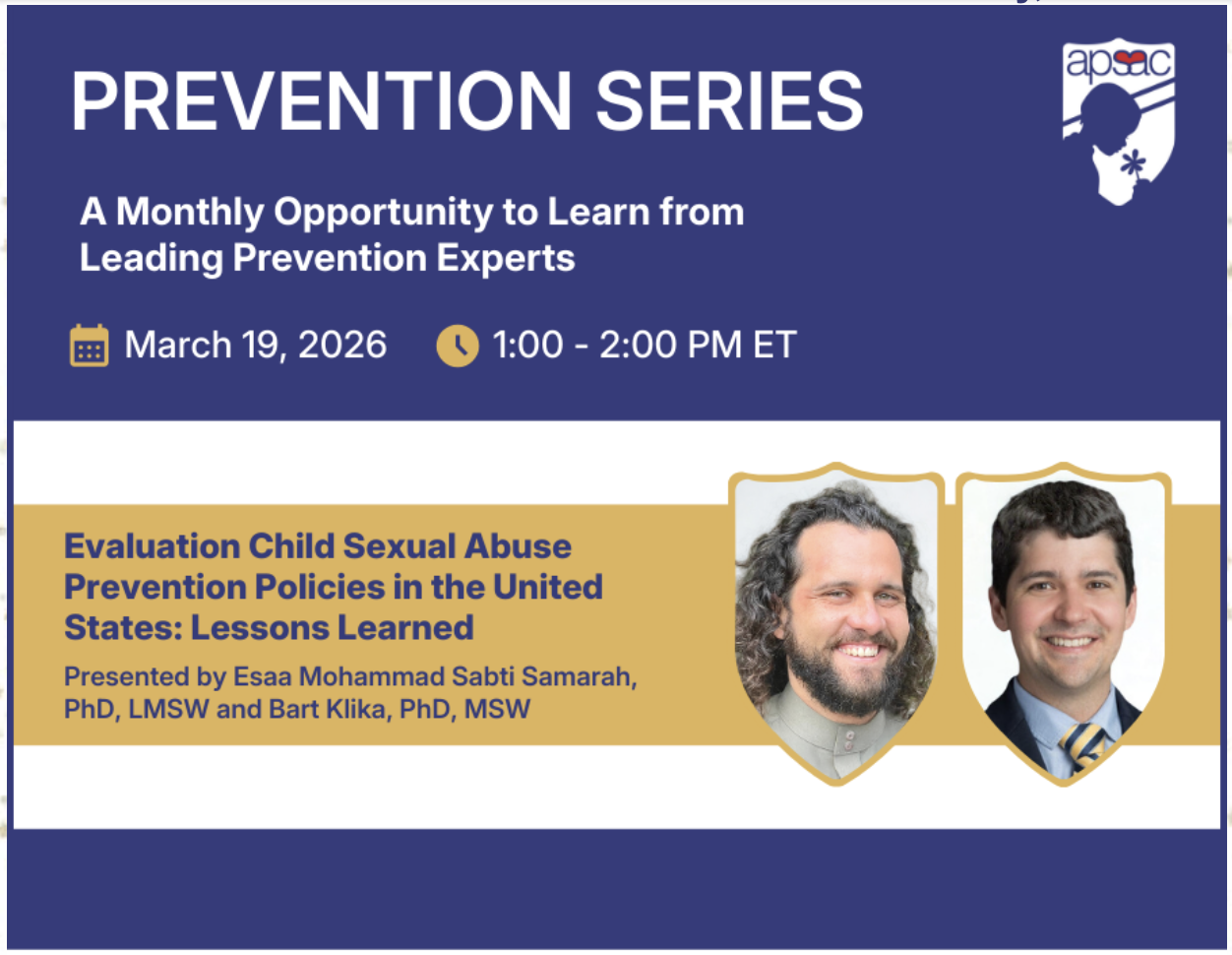 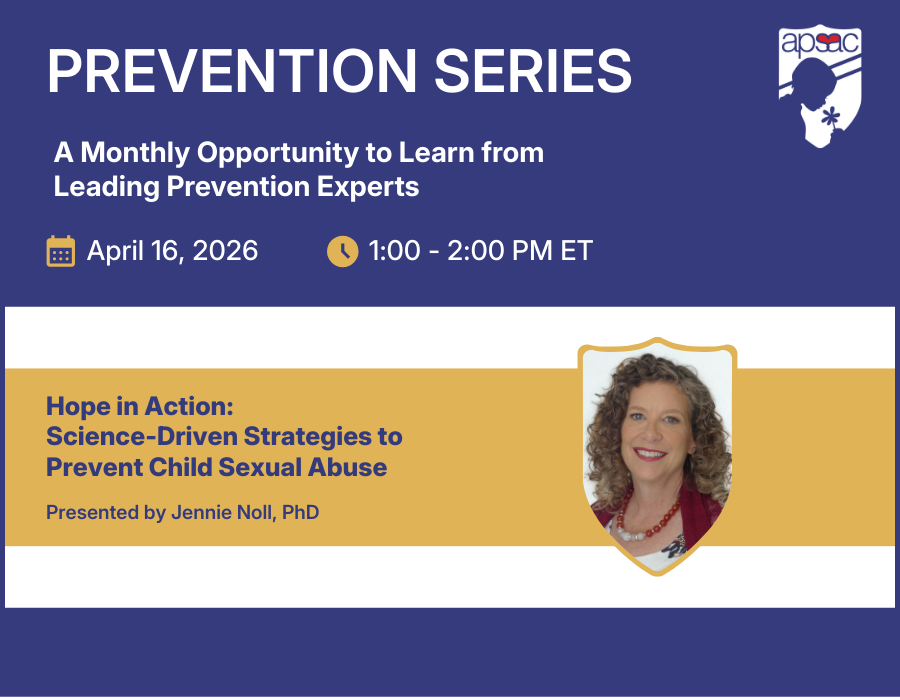 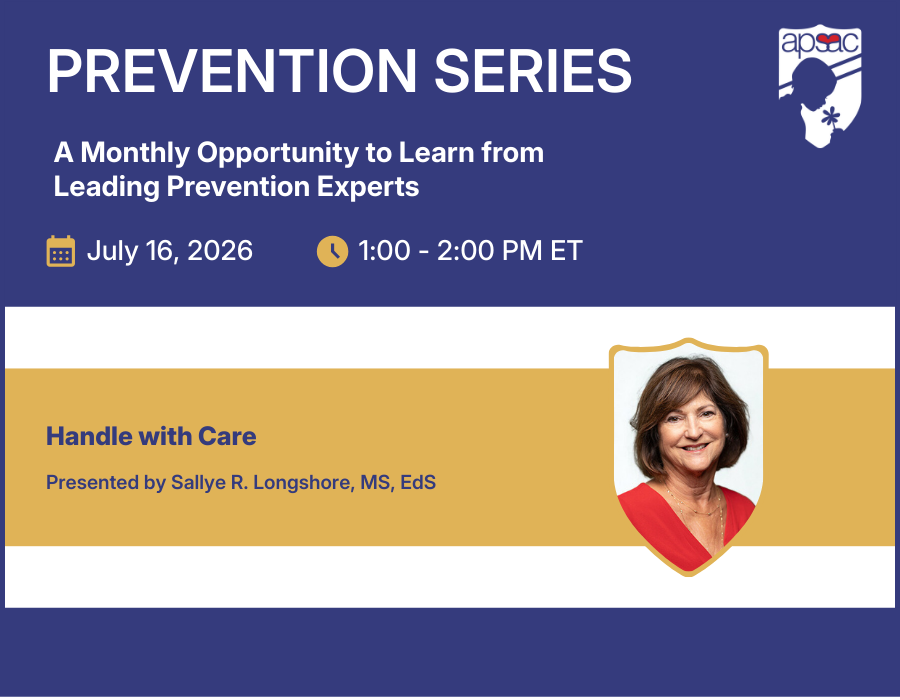 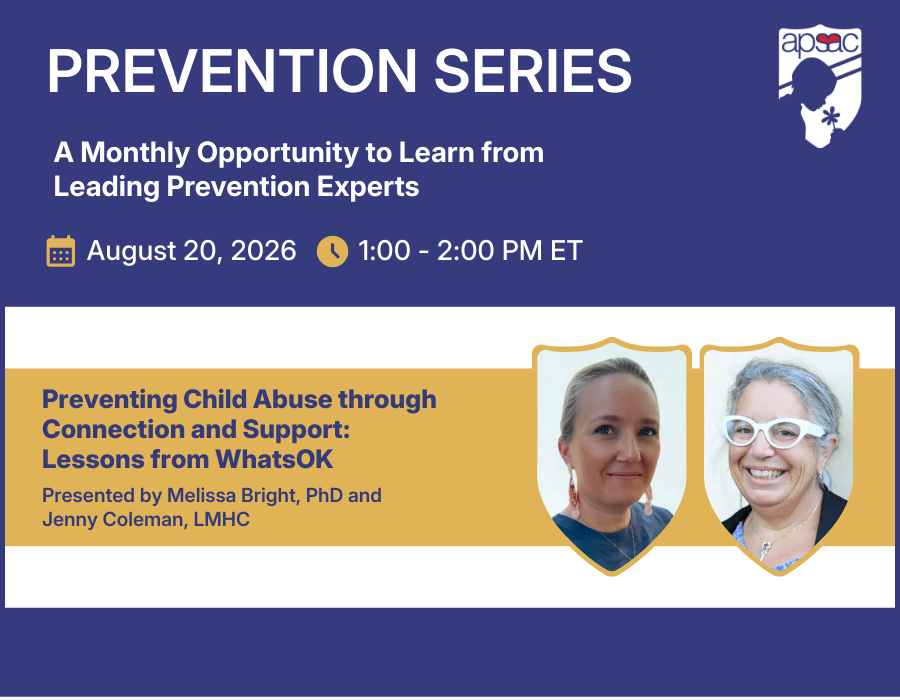 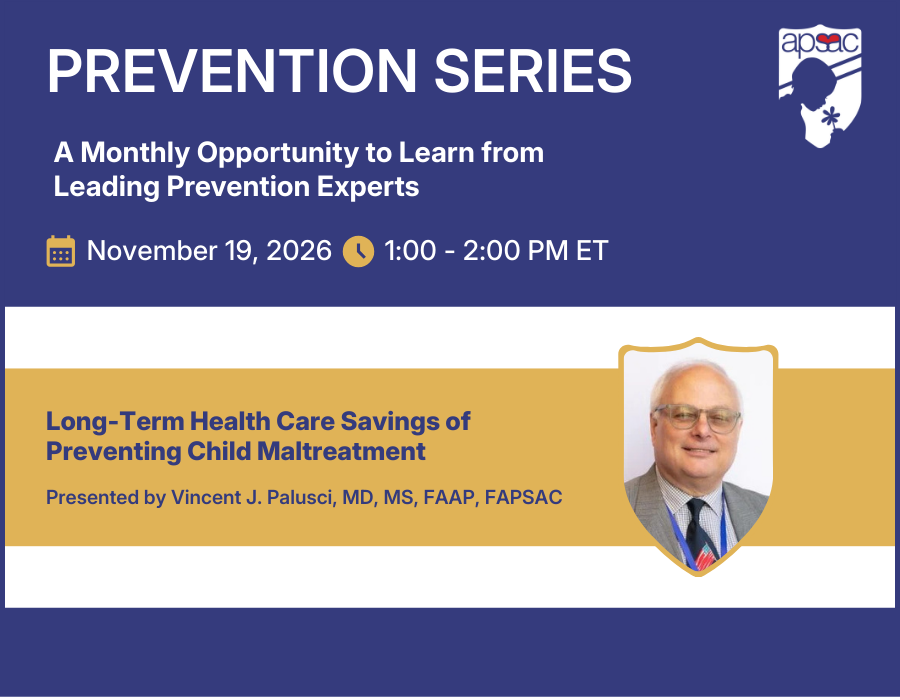 January 15, 2026: presented by Pastor Dan Broyles and Dr. Michael Rauso February 19, 2026: presented by Natalie Gallo, M.Ed., LPC March 19, 2026: presented by Esaa Mohammad Samarah & Bart Klika, PhD April 16, 2026: presented by Jennie Noll, PhD May and June: Summer Break July 16, 2026: presented by Sallye R. Longshore, MS, EdS August 20, 2026: presented by Mellissa Bright, PhD & Jenny Coleman, LMHC November 19, 2026: presented by Vincent J. Palusci, MD, MS, FAAP, FAPSAC Save the Fall 2026 Dates: September 17 and October 15 December 17, 2026: presented by Corinna Jenkins Tucker, PhD, CFLE & Tanya Rouleau Whitworth, PhD more info... | 1/15/2026 -12/17/2026 | 1:00pm to 2:00pm | ||||||||||||||||||||||||||||||||||||||||||||||||||||||||||||||||||||||||||||||||||||||||||||||||||||||
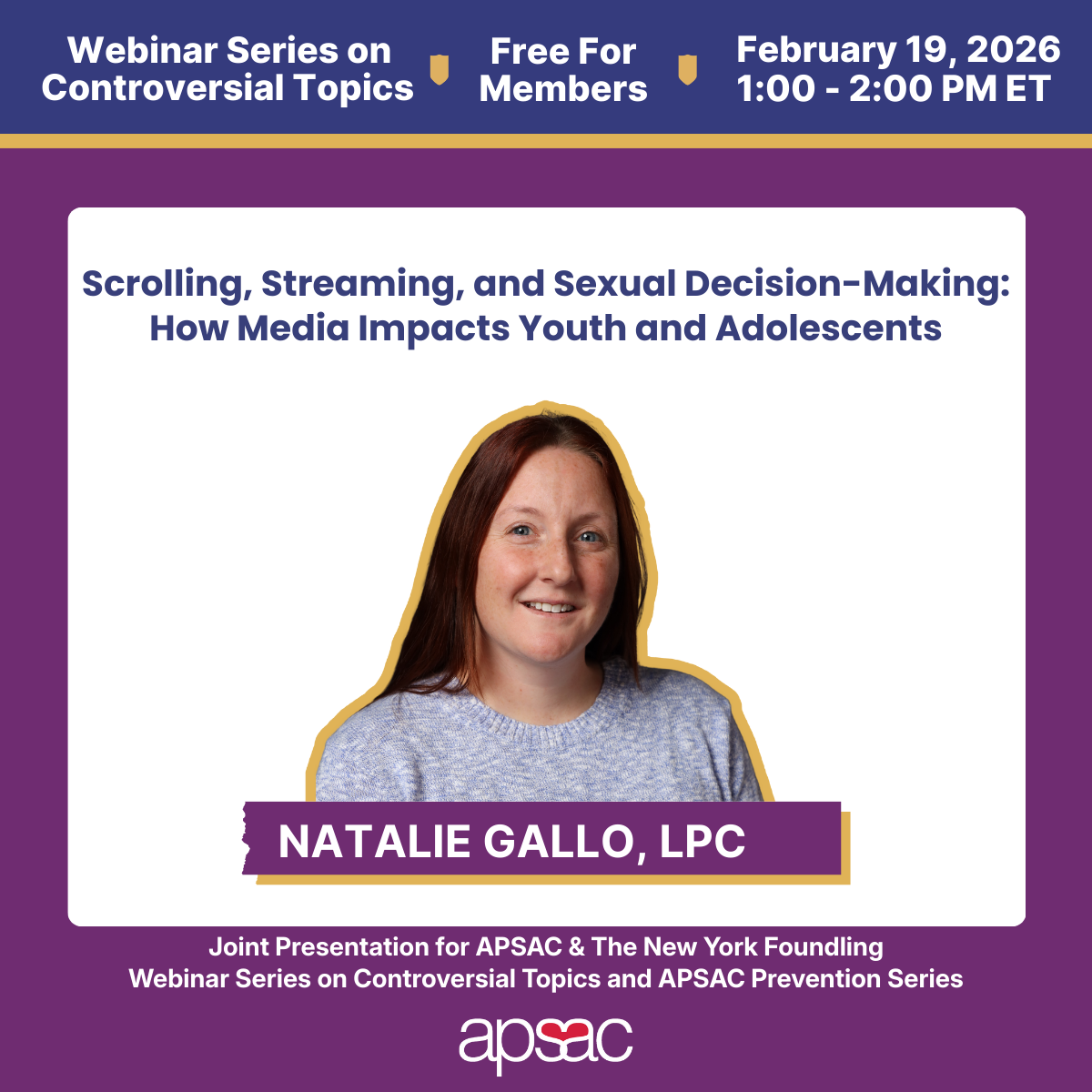 General Admission (individual session): $30.00 APSAC Members and The New York Foundling Staff Admission: Free 1 CE Credit (Social Work & Psychology) Non-Members: $30.00 1 CE Credit (Social Work & Psychology) APSAC Members and NY Foundling: $20.00 APSAC Members: You will receive your discount automatically when registering. The New York Foundling Staff: Please email FontanaCenter@nyfoundling.org to request your entry code. Target Audience and Content Level: Multidisciplinary professionals / Intermediate Interactive, Live Zoom We would love to see you! Please be prepared to have your camera on whenever possible. It helps create a more connected and engaging experience for everyone. If you need to turn it off, we trust you to take care of yourself. If you are requesting continuing education credit, being on camera is required for verification purposes. We appreciate your understanding and participation! Title: Scrolling, Streaming, and Sexual Decision-Making: How Media Impacts Youth and Adolescents Presenter: Natalie Gallo, LPC Description: This presentation will explore the recent trends in sexual media exposure to children and adolescence and the impact it has on their own sexual decision-making. Social media, AI, and the internet bring significant positive experiences to the lives of youth, yet most online platforms come with risks - both obvious and surprising. The audience will gain increased understanding of the online word youth are navigating, the influence this has on their sexual development, and resources for professionals, youth, and their caregivers. Bio: Natalie Gallo, LPC, is a Licensed Professional Counselor at the University of Oklahoma Health Campus (OUHC), Center on Child Abuse and Neglect (CCAN). Ms. Gallo received her Master of Education in Professional Counseling from the University of Oklahoma in 2016. Her clinical experiences include evidence-based interventions for children with disruptive behavior disorders, posttraumatic stress disorder and other trauma-related disorders, children with problematic sexual behavior, and selective mutism. Ms. Gallo is the Program Director for CCAN’s Program for Adolescents with Problematic Sexual Behavior (PSB-A). Ms. Gallo is the Adolescent Training Director and a lead trainer in the University of Oklahoma Problematic Sexual Behavior – Cognitive Behavioral Therapy™ (PSB-CBT™) model, in which she provides national training and consultation in the PSB-CBT™ adolescent age model, assists with the initial assessment of needs and design a training plan to facilitate teams use of the evidence-based program, collaborative care, and engagement of stakeholders. She recently co-wrote an update to the PSB-CBT-Adolescent Treatment manual with Drs. Schmidt and Galsky of NCSBY. (Schmidt, Gallo, & Galsky 2021). Ms. Gallo is a nationally certified therapist in Trauma-Focused Cognitive Behavioral Therapy (TF-CBT), an evidence-based treatment for children and adolescents impacted by trauma and their parents or caregivers, facilitates trainings with the Oklahoma TF-CBT training team on trauma-focused assessments and advanced implementation of TF-CBT, is a certified provider in Parent-Child Interaction Therapy (PCIT), an evidence-based treatment for young children with disruptive behavior disorders, and a certified therapist in PCIT for Selective Mutism (PCIT-SM) an evidence-based treatment for youth are selectively mute due to severe social anxiety. Registration will remain open through the start of the WebinarZoom Webinar System Requirements For the best experience, use a computer or mobile device with a stable internet connection. Please have the latest version of Zoom installed, along with working speakers and a microphone. A webcam is required if you're requesting continuing education credit. CE Course Completion Steps
Accessibility Accommodations: To request accessibility accommodations, please contact APSAC at onlinetraining@apsac.org. Provider Statements: Social Work: The American Professional Society on the Abuse of Children (APSAC), provider #1622, is approved as a provider for social work continuing education by the Association of Social Work Boards (ASWB ), www.aswb.org, through the Approved Continuing Education ( ACE ) program. APSAC maintains responsibility for the program. ASWB Approval Period: 7/27/2025-7/27/2028. Social workers should contact their regulatory board to determine course approval for continuing education credits. The Social worker participating in this conference received 1 continuing education clock hours.” Psychology: The American Professional Society on the Abuse of Children, Inc (APSAC) is approved by the American Psychological Association (APA) to sponsor continuing education for psychologists. The American Professional Society on the Abuse of Children maintains responsibility for this program and its contents. Cancellations and Refunds: No cancellations. No refunds. Registration is transferable. Requests for transfer to a future event will also be considered on a case-by-case basis. If you have any questions, please email us at onlinetraining@apsac.org. Questions and Concerns: Please contact the APSAC team at onlinetraining@apsac.org Cancellations: No cancellations. No refunds. Registration is transferable. Requests for transfer to a future event will also be considered on a case-by-case basis. If you have any questions please email us at onlinetraining@apsac.org. more info... | 2/19/2026 -2/19/2026 | 1:00pm to 2:00pm | ||||||||||||||||||||||||||||||||||||||||||||||||||||||||||||||||||||||||||||||||||||||||||||||||||||||
Title: The Intersection of Mental Health, Education, and Child Well-Being of BIPOC Families Presenters: Masica Jordan Alston, EdD, LCPC; Nikki Ham, EdD; Melissa Duchene Kelly, PhD; Brittany Williams-Grant, PhD 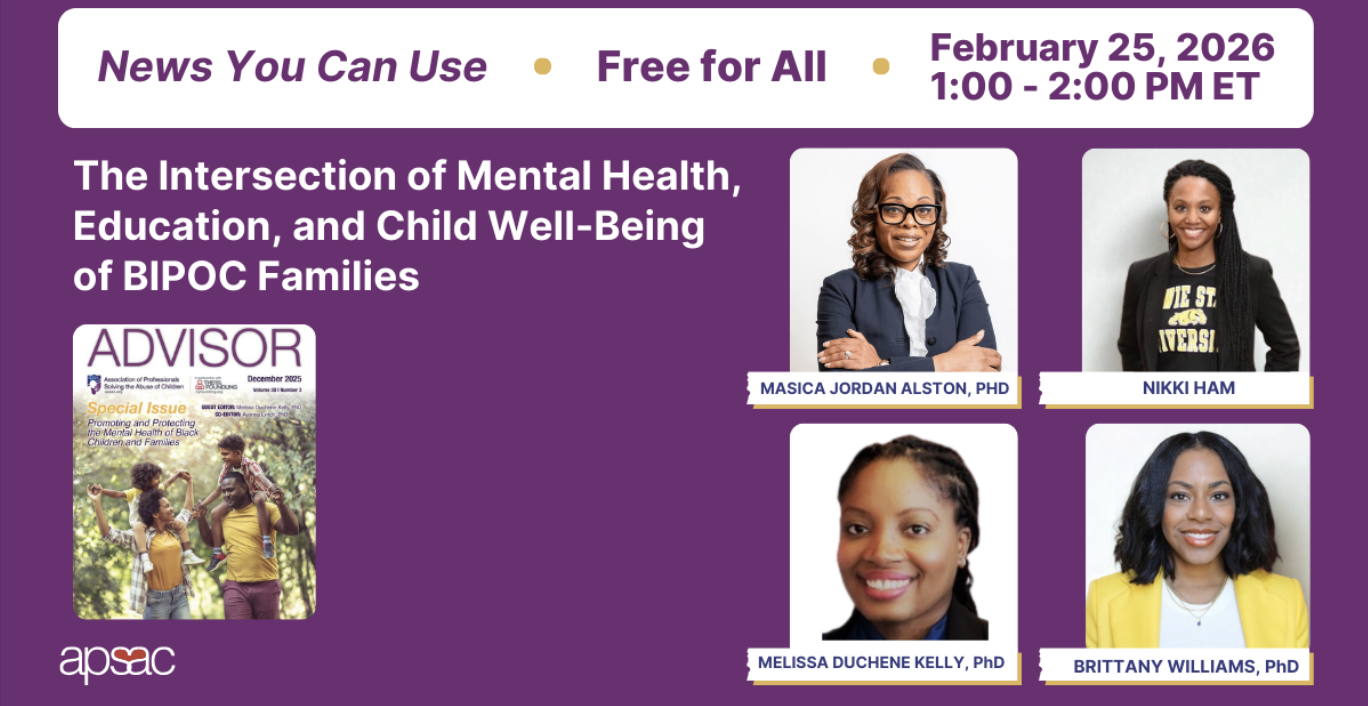 more info... | 2/25/2026 -2/25/2026 | 1:00pm to 2:00pm | ||||||||||||||||||||||||||||||||||||||||||||||||||||||||||||||||||||||||||||||||||||||||||||||||||||||
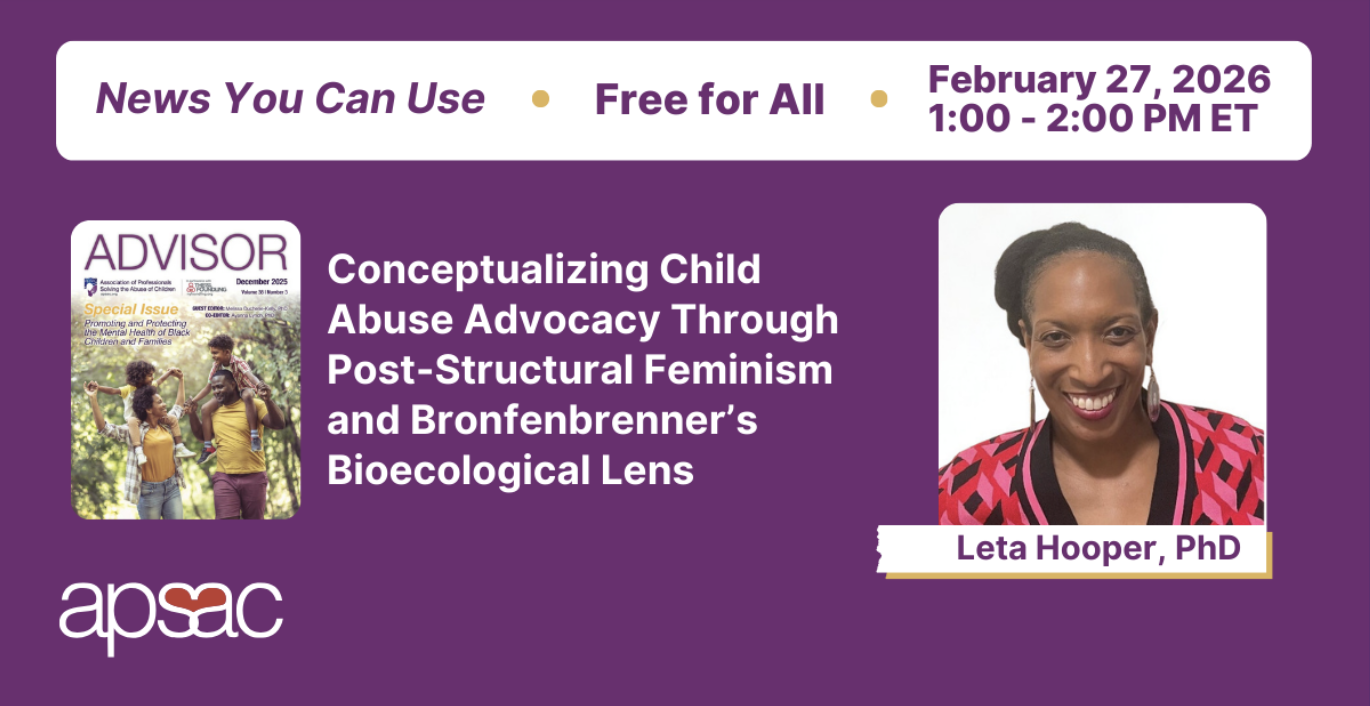 Title: Conceptualizing Child Abuse Advocacy Through Post-Structural Feminism and Bronfenbrenner’s Bioecological Lens Presenters: Leta Hooper, EdD Bio: Dr. Hooper is an assistant professor and coordinator of the Early Childhood Special Education Program at Bowie State University. Her research interests focus on examining how institution’s policies, practices, and curriculum impact Black pre-service, novice, and experienced educators’ personal and professional identities, feminism, and critical pedagogy in teacher education. more info... | 2/27/2026 -2/27/2026 | 1:00pm to 2:00pm | ||||||||||||||||||||||||||||||||||||||||||||||||||||||||||||||||||||||||||||||||||||||||||||||||||||||
Registration will remain open through the start of the Webinar
Accessibility Accommodations: To request accessibility accommodations, please contact APSAC at onlinetraining@apsac.org. more info... | 3/11/2026 -4/29/2026 | 12:00pm to 1:30pm | ||||||||||||||||||||||||||||||||||||||||||||||||||||||||||||||||||||||||||||||||||||||||||||||||||||||
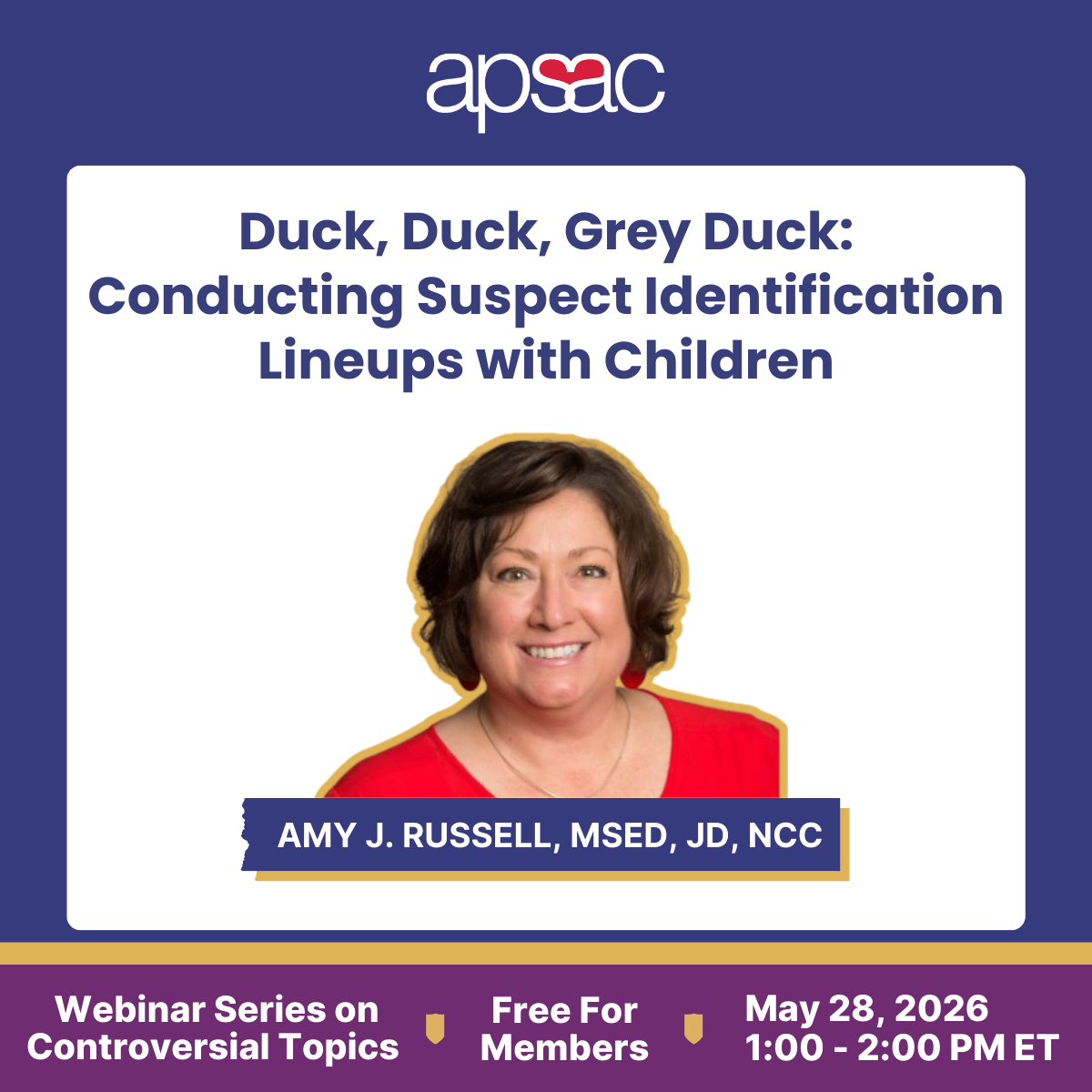 General Admission (individual session): $30.00 APSAC Members and The New York Foundling Staff Admission: Free 1 CE Credit (Social Work & Psychology) Non-Members: $30.00 1 CE Credit (Social Work & Psychology) APSAC Members and NY Foundling: $20.00 APSAC Members: You will receive your discount automatically when registering. The New York Foundling Staff: Please email FontanaCenter@nyfoundling.org to request your entry code. Target Audience and Content Level: Multidisciplinary professionals / Intermediate Interactive, Live Zoom We would love to see you! Please be prepared to have your camera on whenever possible. It helps create a more connected and engaging experience for everyone. If you need to turn it off, we trust you to take care of yourself. If you are requesting continuing education credit, being on camera is required for verification purposes. We appreciate your understanding and participation! Title: Duck, Duck, Grey Duck: Conducting Suspect Identification Lineups with Children Presenter: Amy J. Russell, MSEd, JD, NCC Bio: Amy Russell is an attorney and national certified counselor who has worked with victims of violence and trauma in several capacities, including interviewer for suspected child victims and witnesses of state and federal crimes; counselor for survivors of homicide victims; and pro bono attorney for children in dependency court. She has served as director of several Children's Advocacy Centers; provided national and international training on child abuse and exploitation; serves as an expert witness in child maltreatment cases at the local and federal level; and authored multiple articles on forensic interviewing, child maltreatment and vicarious trauma. Description: Children experience exploitation and witness violence, and may be asked to identify unknown suspects during the course of an investigation. However, children may fail to correctly identify a suspect for multiple reasons. This presentation will review the research on child eyewitness lineup identification; identify issues that may lead to incorrect suspect identifications; and discuss techniques to improve children’s eyewitness accuracy in lineup identifications. Learning objectives: 1. Understand the research on child eyewitness suspect lineup identification, including issues of eyewitness bias, and how it connects to child abuse forensic interviews and investigations
2. Identify memory and trauma issues that may lead children to incorrectly identify a suspect in lineups 3. Discuss techniques to improve children’s eyewitness accuracy in suspect lineup identification procedures References available upon request. Registration will remain open through the start of the WebinarZoom Webinar System Requirements For the best experience, use a computer or mobile device with a stable internet connection. Please have the latest version of Zoom installed, along with working speakers and a microphone. A webcam is required if you're requesting continuing education credit. CE Course Completion Steps
Accessibility Accommodations: To request accessibility accommodations, please contact APSAC at onlinetraining@apsac.org. Provider Statements: Social Work: The American Professional Society on the Abuse of Children (APSAC), provider #1622, is approved as a provider for social work continuing education by the Association of Social Work Boards (ASWB ), www.aswb.org, through the Approved Continuing Education ( ACE ) program. APSAC maintains responsibility for the program. ASWB Approval Period: 7/27/2025-7/27/2028. Social workers should contact their regulatory board to determine course approval for continuing education credits. The Social worker participating in this conference received 1 continuing education clock hours.” Psychology: The American Professional Society on the Abuse of Children, Inc (APSAC) is approved by the American Psychological Association (APA) to sponsor continuing education for psychologists. The American Professional Society on the Abuse of Children maintains responsibility for this program and its contents. Cancellations and Refunds: No cancellations. No refunds. Registration is transferable. Requests for transfer to a future event will also be considered on a case-by-case basis. If you have any questions, please email us at onlinetraining@apsac.org. Questions and Concerns: Please contact the APSAC team at onlinetraining@apsac.org Cancellations: No cancellations. No refunds. Registration is transferable. Requests for transfer to a future event will also be considered on a case-by-case basis. If you have any questions please email us at onlinetraining@apsac.org. more info... | 5/28/2026 -5/28/2026 | 1:00pm to 2:00pm | ||||||||||||||||||||||||||||||||||||||||||||||||||||||||||||||||||||||||||||||||||||||||||||||||||||||
Theme: Connecting. Solving. Bridging. For over three decades, the APSAC Colloquium has been a cornerstone for professionals and researchers working to prevent and respond to child maltreatment. Now in its 33rd year, this go-to conference continues to bring together the field’s most respected voices and emerging innovators for a one-of-a-kind learning and networking experience. The 33rd APSAC Colloquium brings together professionals, researchers, and advocates who believe that real progress happens when we connect across disciplines, solve with shared purpose, and bridge gaps in systems, communities, and understanding. Set in vibrant New Orleans, where collaboration and culture meet, this year’s gathering invites voices to come together -where various voices harmonize like jazz, creating bold, lasting solutions for children and families. For the third year in a row, the Colloquium returns to New Orleans—a city where scholarship meets soul. Attendees don’t just come for the sessions—they return for the connection, culture, and community. Past participants have paraded in second lines, joined jazz-infused bar crawls, and built meaningful collaborations over beignets and bold ideas. Group Registration Discounts Cancellations: APSAC adheres to a No Cancellation and No Refund policy. This long-standing approach is consistent with industry standards for nonprofit conferences and reflects the significant planning and financial commitments that each registration represents. Registration fees cover costs such as venue requirements, materials, and food & beverage which are arranged in advance based on expected attendance. For this reason, all registration fees are final upon submission. Transfer Requests: Unpaid Registrations We appreciate your understanding and continued support of APSAC’s mission to promote excellence and accessibility in the field of child maltreatment prevention and response.
more info... | 6/14/2026 -6/18/2026 | 8:00am to 5:00pm | ||||||||||||||||||||||||||||||||||||||||||||||||||||||||||||||||||||||||||||||||||||||||||||||||||||||
 Description: This workshop will share strategies to help you model for parents what to say and actions to take in order to obtain needed programs, benefits, entitlements and services for their child with a disability. We will share possible barriers and strategies to hopefully help our families overcome those barriers so they can be the best possible advocates for their child and family. The session will allow participants to share their own advocacy victories as well as get feedback pertaining to current difficulties they might be encountering while trying to advocate on behalf of parents. It take more than a village these days, it takes a universe of dedicated advocates to help our vulnerable families. Presenter: Gary Shulman, MS, Ed more info... | 10/8/2026 -10/8/2026 | 1:00pm to 2:00pm | ||||||||||||||||||||||||||||||||||||||||||||||||||||||||||||||||||||||||||||||||||||||||||||||||||||||
